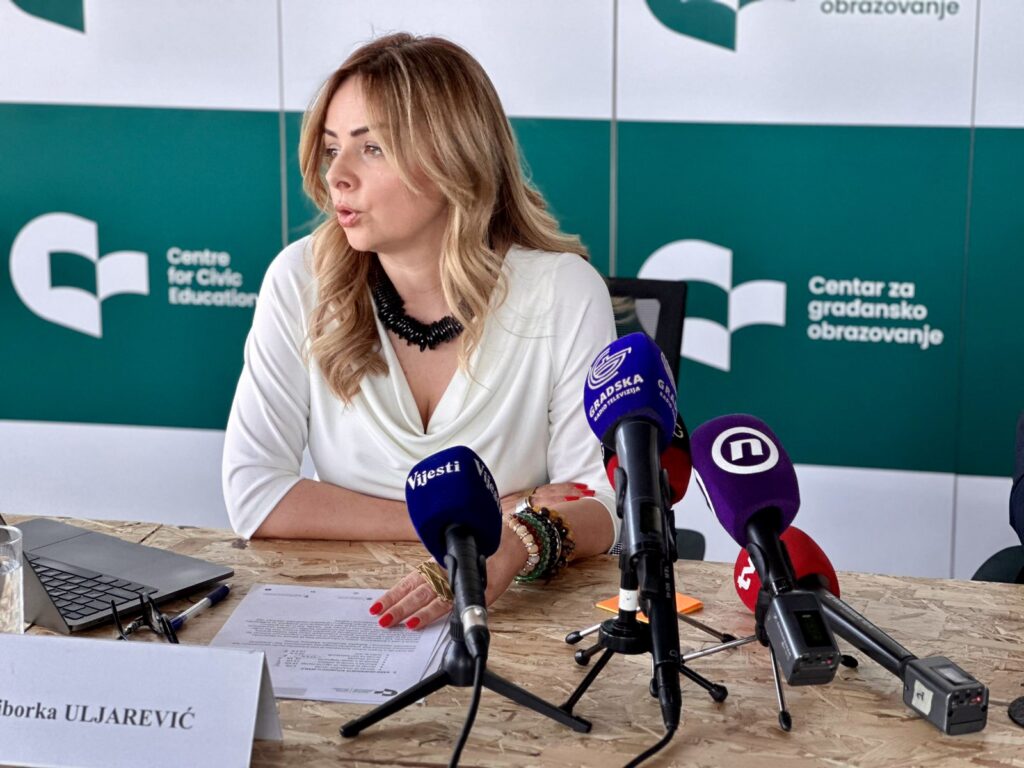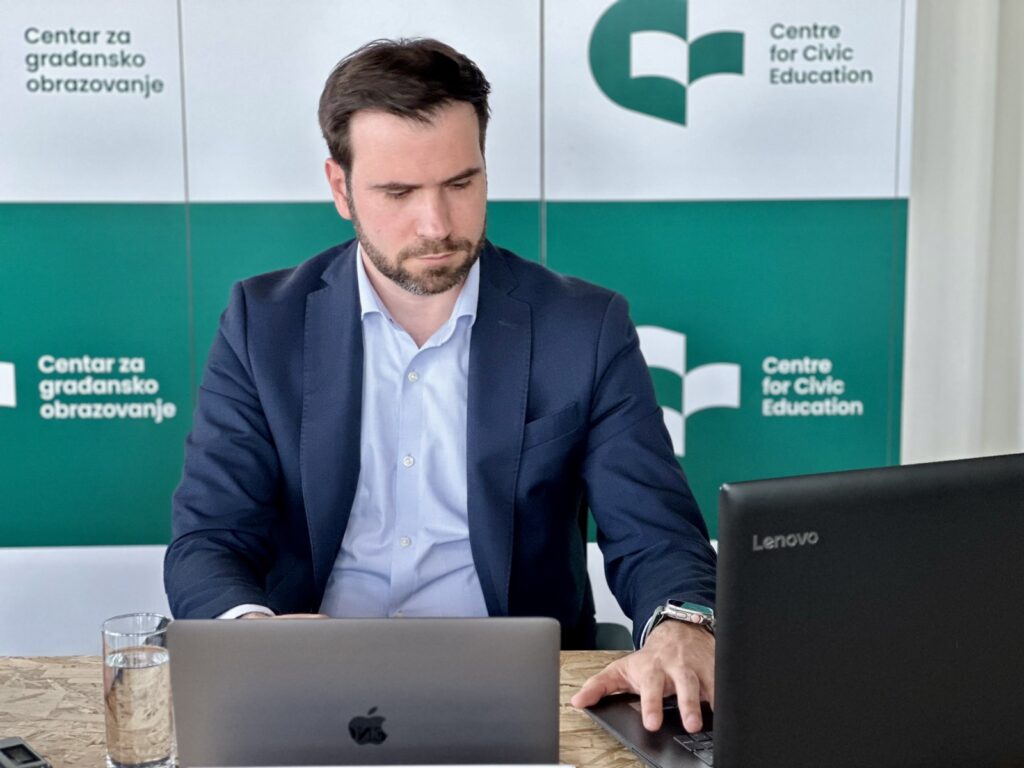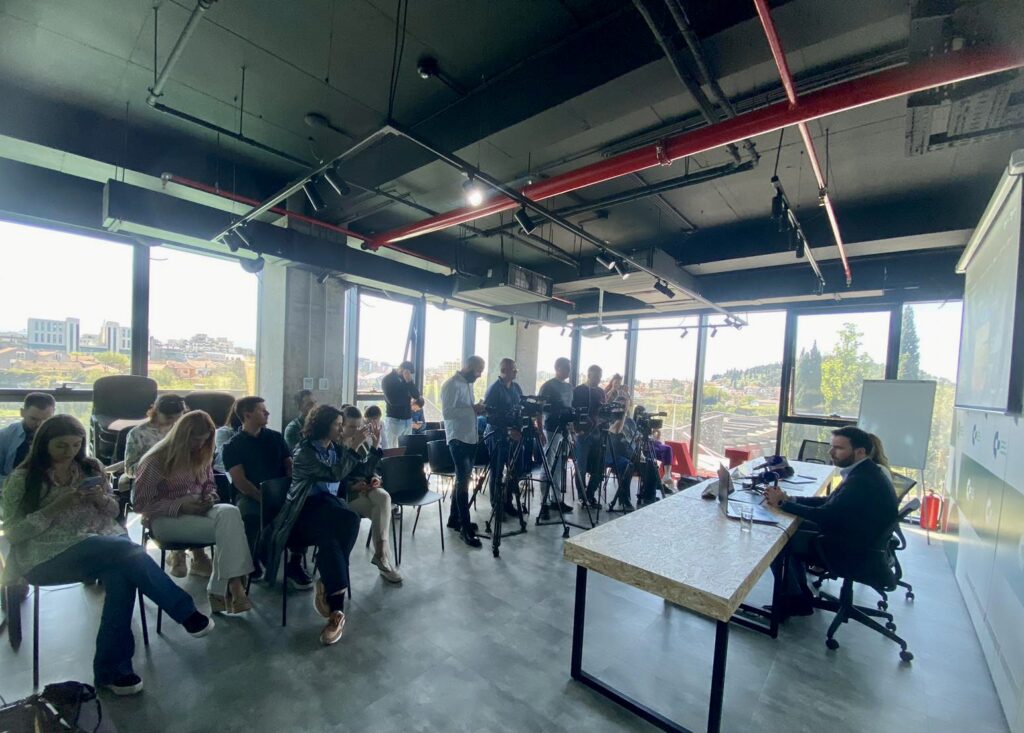In Montenegro, the critical attitude towards various actors and processes is increasingly pronounced, which can be seen through the generally rather low level of trust in institutions, caution in defining the situation, rationality in sorting out priority issues, but also a deeper view concerning the difference between the rule of law and political tactics, as indicated by some of the findings of the MNE Pulse presented today, published by the Centre for Civic Education (CCE) and the DAMAR agency.
“Trust in institutions on a scale from 1 to 4 does not even reach three, and mostly hovers around low and mediocre for everyone, with the now already chronic finding that political parties are at least trusted, and they are not respected, but people run there as they have the power of decision-making and management of processes. On the other hand, we have an extremely high-ranking NGO sector, whose critical part is a frequent target of politicians. Also instructive is the low trust in the media, which is seen as too biased. On the other hand, and according to earlier research, leading the list are religious communities, which also have a high degree of political mobilization in recent years. Compared to previous waves, the educational system and healthcare remain at the top, but there is an increase in trust in the prosecution and a decrease in trust in the police,” said Daliborka Uljarević, Executive director of the CCE.
“It seems that the citizens of Montenegro are in a state of cautious anticipation in which, for now, the growing trend of pessimism and the feeling that Montenegro is on a bad path, since the mid of last year, has only begun to stagnate. However, there is no dominant position that things are well set. The stagnation of pessimism is most illustratively seen in the reduction of the share of those who believe there is a crisis, which fell from 32.1% in October 2022 to 17.3%. Optimists that things are going in a better direction are of the Serbian nationality, while pessimism dominates amongst those of the Montenegrin nationality, as well as minority communities – Bosniaks, Muslims, Albanians, Croats”, explained Uljarević reflecting on comparative data on the perception of the direction in which state is heading and assessment of the situation.

With the option to give more answers, citizens state that they are currently most concerned about the rise in prices (68%), corruption and organised crime (41.2%), unemployment (36%), the possibility of internal instability and conflicts (23.9%), followed by political situation (28%), then health (21.6%), slow changes in society (15.8%), international instability (15.7%) and identity issues (8.3%).
“Problems that remain at the top are related to an economic existence, as well as corruption and organised crime, which indicates that it is a formed, almost endemic situation that goes beyond the borders of individual regimes as the government has changed, but the problem remains pronounced. Of particular concern is the high level of fear of internal conflicts and political instability, which is rarely seen in the region, except in the case of Bosnia and Herzegovina. Also, it seems that citizens are quite synchronized when it comes to the perception of these problems, with the only difference that Montenegrins and members of minority communities see the possibility of internal instability and conflict as a more prominent problem than others,” said Uljarević in her comment on these data.
In the part of the perception of the judiciary and the rule of law, a significant step forward is noted through the assessment that certain parts of the system are beginning to function.
More than a quarter see the latest arrests and detentions as a sign that the system has started to work, which is a three-fold increase compared to the first measurement of this segment from July 2022, then more than a third support it but express a reserve until track record in the form of indictments and verdicts, while the number of those who state that many will get away without punishment or that it is a show is decreasing, and the number of those who have an opinion on this issue is also increasing.
“This change in the part of improving perception has a pronounced growth when it comes to Special State Prosecutor (SSP), with a note that this growth is primarily recorded when the wave also includes certain measures and actions related to the current holders of power (the cases of Rade Milošević and Milo Božović). Almost a quarter believe that there are no untouchables for him, the number of those who think that he initiates proceedings only against those who lose political influence is decreasing, and less than a quarter believes that he depends on politicians. So, the efforts of this body are appreciated, but the pillar that holds the conviction that there are no untouchables for the SSP is in his relation towards those who are perceived to have political power or influence, so it is to be expected that he will strengthen if it acts non-selectively, i.e. that there is a risk of slippage if he is focused only on those who are seen as close to the former government…”, said Daliborka Uljarević.
Two-fifths of respondents believe that abuses of power from the DPS period and new structures are being prosecuted nowadays, while around a quarter believe that only those from the DPS period are in focus.
There is a prevailing belief that the order of the Ministry of Ecology, Spatial Planning and Urbanism to demolish the family house of the outgoing president Milo Đukanović due to controversies over its upgrade is a political act (47%), while slightly more than a quarter see it as an expression of the rule of law (26.7%), and over a quarter cannot assess.
“Less than half of citizens (49%) believe that their income is not enough to cover their expenses in one month. Compared to the previous results, there is an increase of those who state that they can cover their expenses with their income (39.6%). When it comes to the living standard and when the positive and negative responses are summed up, we see that 22% of citizens say that they live better today, 26% believe that they live worse, while half believe that everything is the same as before. Comparing with the results from October and June last year, we have an increase in the number of those who say that they live better now,” said Vuk Čađenović, Executive director of DAMAR.
“In reflection on the reasons for the defeat of Milo Đukanović at the presidential elections, more than a third of the respondents believe that Đukanović was in power too long, there is a similar number of those who assess that he created a system from which he became rich and allowed organised crime to grow. Interestingly, 8% of respondents believe that Đukanović had a bad campaign and that this is the main reason why he lost the elections,” said Čađenović.
Citizens are divided on the question of whether Jakov Milatović should resign from party positions in Europe noe after he is inaugurated as the President of Montenegro, but a slight majority believes that he should not do so (38.7%), while 35.9% are of the opposite position, and a quarter have no opinion on this issue.
“The dominant expectation from Milatović is to be the president of all citizens and to represent the interests of the whole, which is expected by 6 out of 10 citizens, that is, around 60%,” stated Čađenović.
“Citizens believe that the focus of the new Government, after the elections in June, should be on economic issues and improving living standards (63.5%). However, for more than half, there is also the fight against organised crime, and, interestingly, European integration is positioned among the most important issues for about a third. It should also be noted that one-fifth believe that the new government should address the position and perspectives of young people, which was not the case in earlier surveys,” assessed Vuk Čađenović.
The results of the April MNE Pulse indicate that citizens are increasingly sceptical when it comes to the EU accession date, so a third do not have an opinion on when Montenegro will join the EU, and on the other hand, a fifth are pessimistic, i.e. think that Montenegro will not join the EU.
“Part of the questions related to the war in Ukraine indicate that the largest percentage still opposes military action, but compared to the previous findings, from July 2022, it is now decreasing by app. 10%. This Russian military action is supported by 16%, while 56% oppose it, and the percentage of neutral ones jumped to 27.9%. It is similar concerning the sanctions against Russia – almost 35% are now neutral, which indicates to the growth of disinterest or concealment of the position, but also the potential for a change of position,” Čađenović concluded.
“The April Pulse also dealt with a current but chronic problem – peer violence, the growth of which is recognized by the vast majority of citizens (77.6%), and 94% express big or some concern about this problem. The majority also believes that the Government is not responding adequately to the problem of peer violence. Responsibility is dispersive, so it is directed mostly towards parents (67.9%), juvenile abusers (46.2%), and educational institutions (38.7%), as well as to the media and the police, the negative socio-political climate, the courts, the Government, prosecution, politicians, religious communities. However, I think that this recognition of the responsibility of different actors should also be read as an instruction that everyone should strengthen to combat this problem, which everyone sees in an almost identical way, regardless of demographic and other differences”, stated Daliborka Uljarević.
Data collection was carried out by application of the CAPI method, from 14 to 24 April 2023, on a three-stage stratified random sample that included 1022 citizens of Montenegro.
MNE pulse is a joint initiative of the CCE and DAMAR with the aim to use empirical data to help those who work on the strategic democratic shaping of society to make decisions based on reliable data and thorough analysis, keeping citizens in focus. In this manner, the quality of public debate on important issues can be improved, but also the level of responsibility of all actors can be raised.
Since 2023, it has been supported through the Core grant of the SMART Balkans regional project – Civil Society for a Shared Society in the Western Balkans, which is led by the Center for the Promotion of Civil Society (CPCD) from Bosnia and Herzegovina, the Center for Research and Public Policy (CRPM) from North Macedonia and the Institute for Democracy and Mediation (IDM) from Albania, and financially supported by the Ministry of Foreign Affairs of the Kingdom of Norway.
Nikola Mirković, Programme associate


